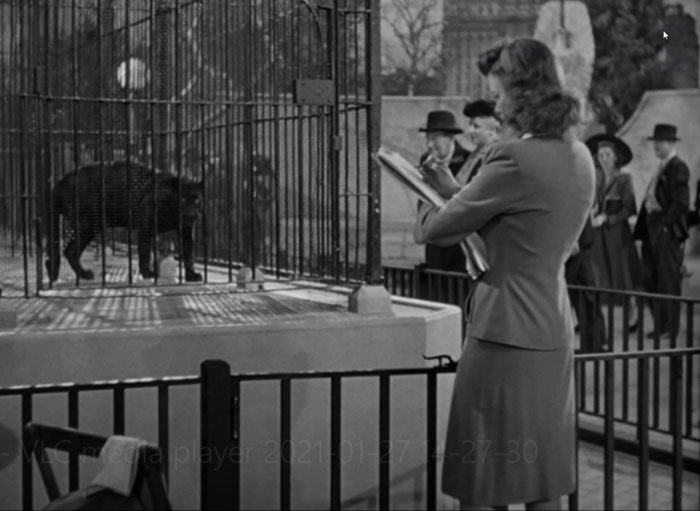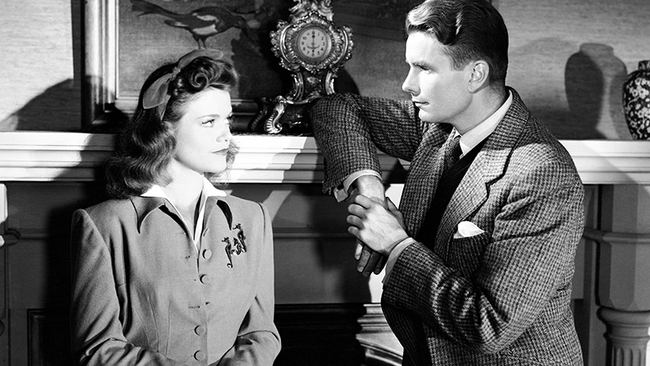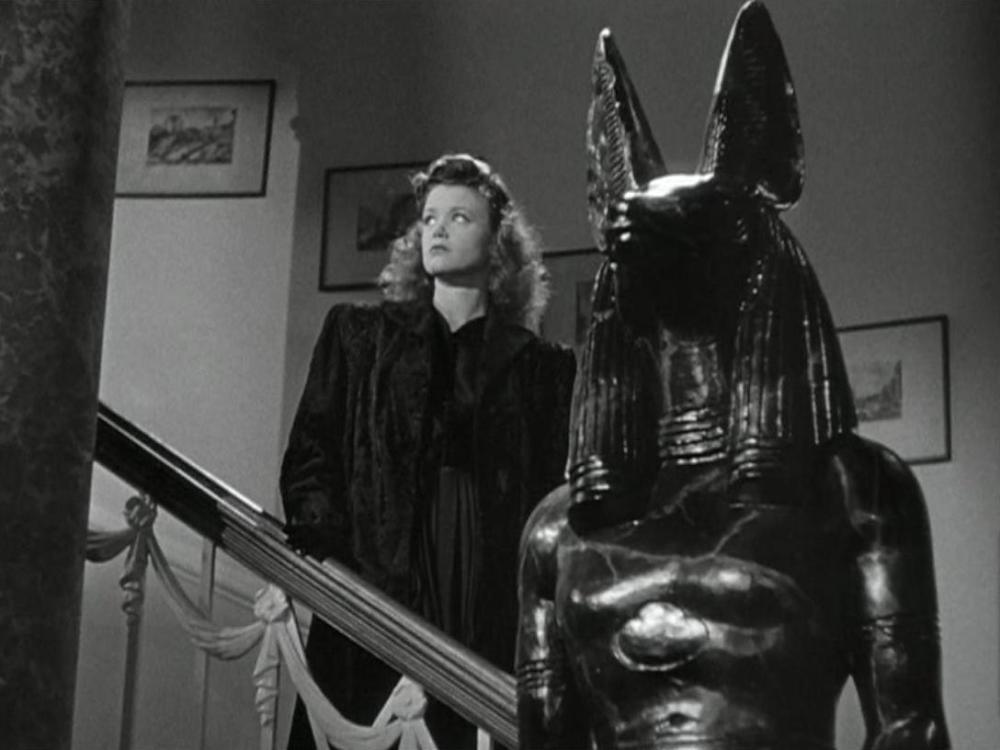Unwelcome, Outcast and Alone: Otherness in ‘Cat People’ (1942)

Irena Dubrovna is a Serbian artist trying to carve out a new life for herself in New York. When not sketching, she pays frequent visits to a panther at the local zoo. This represents a symbolic link to her past and comes to reflect her position as an outsider. Cat People presents a bleak but all too familiar outlook of the immigrant as a threat to patriotic ideologies. Rather than being shown compassion and acceptance, Irena is bombarded with attitudes and behaviours that seek to cast her in the role of ‘other’ as she finds herself feared, rejected and misunderstood.
The film is bookended by two scenes at the zoo, an important setting that speaks to the theme of entrapment. In the opening, Irena stands before a caged panther that paces about its cell-like cage, a clear reflection of how she feels in her own strange environment. Sketching the creature in a notebook, Irena effectively draws herself as a solitary subject who is lonely and frustrated. Suddenly, she crumples the sketch into a ball, throwing it into a nearby rubbish bin. But, her aim is off and she misses.
In a gesture that appears to be kind-hearted, a man spots the litter and picks it up. However, this is followed by him issuing a pointed finger towards a notice. This acts as the first warning that Irena is not welcome. The sign reads: “Let no one say, and say it with shame, that all was beauty here until you came”. Although designed to warn members of the public from littering, seen in this context it contains a darker connotation, namely that before Irena arrived, America was a beautiful country. Now, it’s at risk of being spoilt.
Related: ‘Hatching’ Is A Monstrous Coming-of-Age Horror For The Digital Age [Sundance 2022]
The man in question, Oliver Reed, makes an approach towards Irena and they share an exchange of pleasantries. But as they leave a gust of wind blows the drawing into a corner. The sketch is revealed to be a panther. It’s sleek and strong but also in pain from the presence of a piercing sword impaled through its body. Like Irena, the animal is wounded. Whilst walking amongst the sidewalks of the city, Oliver inquires if Irena is from Russia. She replies, “No, Serbia” before asking her to spell her name. On the surface, this might seem to be an innocent request. But by compelling Irena to spell out her name (notably she does not ask him to do the same), he highlights their difference.

Entering her building where they’ve agreed to share tea, she tells him tenderly that he’s “the first friend I’ve had in America, my first real friend”. It’s clear she is humbled to have made this connection. When they step inside, the traditional string score instantly shifts, becoming magical, twinkling like a lullaby. Such a choice (coupled with the reference to her using too much perfume), seeks to represent Irena as mystical in a demonstrative manner. In 1942 that may have been acceptable but, in 2021 it feels reductive.
Related: ‘Master’ Explores The Scary Realities of Academia [Sundance 2022]
Sitting in the darkness of the apartment, Irena hums hypnotically. This is reciprocated by a roar from lions at the nearby zoo. It’s as though she were communicating directly with them. She explains that while people in the building complain of the animalistic noises, she feels an affinity with the lions which to her are “natural, soothing”. The sound of a panther is also heard. But this doesn’t elicit the same response from Irena who describes it as “screaming like a woman”. These cries are unpleasant precisely because they represent her own internal scream from within that she is unable to release.
We see a prominent statue of King John, a man on horseback spearing a cat, acting as a literal embodiment of Irena’s sketch. The figure, we learn, drove out the Mameluk community from Serbia before freeing the people. Of the object, Oliver asks tentatively, “Why have this around, what does it mean?” She retorts that he wouldn’t question her keeping a portrait of George Washington or Abraham Lincoln; what’s the difference? The statue has significant meaning for Irena. But Oliver’s failure to acknowledge and recognise her culture as she has recognised his points to his ignorance and narrow-mindedness.
In sharing her history and background with him, Irena is evidently eager to make a human connection and find a confidant. Unfortunately, Oliver shows no wish to engage in conversation. Instead, he smiles and shrugs, “I don’t see what this has to do with you”, a colossal misjudgement as this has in fact, everything to do with her. Rather than allowing Irena to talk freely on a subject that clearly has an impact upon her, he quickly makes an excuse to leave.
Related: ‘Darkness Falls’ Makes for a Scary Nostalgic Time [Rotten Outlook]
Shortly after their first meeting, Oliver buys Irena a cat as a gift. If however, he had been listening attentively during her disclosure at her apartment he would have realized that this is an inappropriate choice with the potential to evoke a triggering response. Before presenting Irena with the creature, he keeps it enclosed in a box, thus representing a scaled-down version of the panther in the cage at the zoo and, more specifically, Irena. When she and the cat meet, the feline cannot be near her. Oliver remarks upon how it had no such qualms in interacting with his co-worker, Alice. This is a reflection on how accepted she is by comparison to outsider Irena.

The pet store is full of cages in all shapes and sizes, further echoing Irena’s own feeling of entrapment-they decide to swap the cat. When she steps inside to take a look, the animals scream and riot; even they do not seem able to welcome her. Softly and delicately, she takes a canary cage declaring, “I like to be liked”. All that Irena craves is love, affection and to find a place where she has a sense of belonging.
As the pair get closer, Oliver realises that Irena is uncomfortable with physical affection. When they discuss why she is unable to kiss him, he cannot resist reminding Irena of her difference. He even suggests that doing things ‘the American way’ is the only option. He says, “In America, when people love each other usually they’ve kissed by now”. Once more, when Oliver should be listening, he insinuates that her behaviour is linked to the fact she is a non-American. Irena advises how “I’ve lived in dread of this moment”, confessing that her fear is so overwhelming that she has maintained her distance from others.
Related: Gale Weathers and the Vilification of Female Ambition
However, by choosing to flee from the past, from ‘evil’ as she explains, she exchanges being accepted as part of a community for isolation and loneliness. Oliver ridicules this, claiming, “it’s nothing more than fairy-tales, they are nothing to do with you really, you’re Irena and you are here in America”. Such a remark is dismissive not only of her ancestry but seeks to align her Serbian connections with mistruths whilst simultaneously trying to encourage separation from them. He continues, saying “You are so normal, you are in love with me, you are going to marry me”. It’s a set of authoritative affirmations (note the repetition of ‘You are’) designed to be coercive. In Oliver’s patriotic outlook, if Irena will just marry, settle down in the promised land and bear him children, all will be well again.

Oliver and Irena are soon married, however. Any notion of attitudes towards her changing now that she is wife to an American are immediately thwarted. At the wedding dinner, Oliver’s boss Mr Carver refers to the waiter as ‘Comitage!’, an address which Irena warns him politely not to use. She advises that this could also be interpreted for labelling him as a thief. In response, he declares, “but it’s Serbian, I got it from my father this afternoon”; he chooses to make a joke of it. This display of ignorance illustrates how Irena is repeatedly exposed to xenophobic attitudes not only within her own social orbit, but within the wider realms of society.
Related: 7 Freaky Found Footage Movies From Around The World
As the celebrations continue, Irena thanks Alice for finding a Serbian restaurant. In return, Alice tells her, “anything you want to know ask me, I know all the unimportant details” before giving a short laugh. It’s incredibly subtle and buried, but the inference behind the combination of both comment and gesture is clear. For Alice, finding a restaurant serving Irena’s national cuisine is ‘unimportant’. We hear another colleague of Oliver’s confide in Alice that Mr Carver is worried about the marriage and has described Irena as ‘odd’.
Delivered in hushed whispers, these secretive conversations act as a breeding ground for widespread prejudices and misgivings relating to Irena’s character. A woman dressed in black at a nearby table addresses Irena in her native tongue, calling her ‘sister’ which unsettles the bride. When Irena attempts to talk to Oliver about this, he nullifies her concerns calling her ‘a crazy kid’. For him, this incident is inconsequential, but for Irena, it’s hugely significant.
One month after their marriage, Irena returns to the zoo. This indicates that she, like the panther, still feels both trapped and alienated by the people around her. A zookeeper remarks of the animal (and therefore of Irena) that it is not ‘beautiful’ as she suggests but instead ‘an evil critter.’ He also declares it to be “like a leopard but not a leopard”, a reflection of Irena’s limbo-like state between cat and human. Before long she visits the panther again, dressed head to toe in black, evoking an undeniable cat-like appearance. In a symbolic gesture, she throws the corpse of her canary into the panther’s cage; the helpless bird which represented life and joyfulness is left to be torn apart by the predatory panther.
Related: Gore-geous Girls: 6 Movies Where Women Aren’t Afraid To Get A Little Bloody
At home, Irena tells Oliver of her envy for “every woman I see on the street”, noting how they please their husbands living “normal happy lives, they are free”. However, the status quo of women existing in this way is by no means idyllic. Rather, there is a dichotomy between women yielding to men and them considered being ‘free’. The American Dream which Irena aspires to is available to some and not others. It’s therefore merely a social construct with dark and disturbing connotations.
At Oliver’s insistence, Irena attends an appointment with analyst, Dr. Judd. She glides back home after the session, hopeful that things will soon improve. However, she finds Alice in her apartment. Alive reveals she knows all about the session and even recommended Dr. Judd to Oliver. Not only has Irena’s space and home been invaded by an American woman but this signifies a shocking betrayal on Oliver’s behalf. Having literally come home to find another woman in her place, Oliver’s disregard for Irena heightens her sense of alienation.
In consultation with Alice, Oliver details how he cannot understand Irena as he has “never experienced unhappiness before”. Mistaking happiness for privilege, Oliver is unable to empathize with Irena because he has never had to fight for anything. Through his status as a white American man, opportunities have always been available to him. Irena soon discovers that Oliver has been speaking further with Alice about their relationship. They quarrel and he heads to the office. A short while later, Irena telephones him at work only to find her call is answered by Alice. She departs the house, stalking her rival down a darkened street. Now it’s Alice’s turn to experience fear and uncertainty.
Related: ‘I Saw the Devil’ Serves Up Bone-Chilling Winter Terror
Oliver continues to neglect his wife in favour of spending time with Alice. At a museum, the pair bond over models of ships, remarking upon how boring this must be for Irena before suggesting she meets them an hour later. Although Irena insists this is not the case, they ensure that she is made to feel that she does not belong. Later, Irena follows Alice to a swimming pool. Isolated, helpless and vulnerable in the water, Alice’s fears relating to Irena come to the surface. They manifest through her screams upon seeing a shadowy presence as she emerges shakily next to a sign which is fittingly marked ‘deep end’.
Alice pays a visit to Dr. Judd where she is told that Irena is frightened of the past, and possesses a ‘strong imagination’ while Alive herself fears the present and has a ‘strong conscience.’ While Judd’s remarks towards both women are hardly complimentary, by describing Alice as having a ‘conscience’ he associates her with logic and reliability. In linking Irena with notions of a ‘strong imagination’, this suggests that she is less far credible. In a final interview with a sexually inappropriate and threatening Dr. Judd, Irena comes to the realisation that she is her best resource for help and healing.
Jubilant once more, she rushes home and prepares a candlelit dinner in anticipation of Oliver’s arrival. When he returns, she announces she is no longer afraid. But tragically, it’s too late as Oliver declares his love for Alice. Upon hearing this, Irena clutches tightly onto the fabric of the couch, remarking that all she has left to love is loneliness.
Related: 5 Haunted Dwellings That Are Too Affordable To Leave
Alice, Dr. Judd and Oliver meet in secret to discuss Irena, with Judd providing two options. Oliver can either annul the marriage or he can have her committed to an asylum. They discuss and decide her future in her absence as once again her input is deemed irrelevant and unnecessary. Retreating back to the office, Alice and Oliver express fear for Irena when a panther begins to advance towards them.
Now fully transformed into the other, Irena is warned off by Oliver who demands she leaves, solidifying the rejection that has permeated throughout the film. There is nothing left for Irena to do but revisit the zoo one final time where she comes face to face with the panther. She releases it from its cage, thus confirming an identification with the other and sealing her deadly fate. In Cat People, whilst Oliver will enjoy a rich and rewarding life with a job, partner and good prospects, Irena’s life has ended just as it started: utterly outcast, unwelcome and alone.
Categorized: Editorials News
